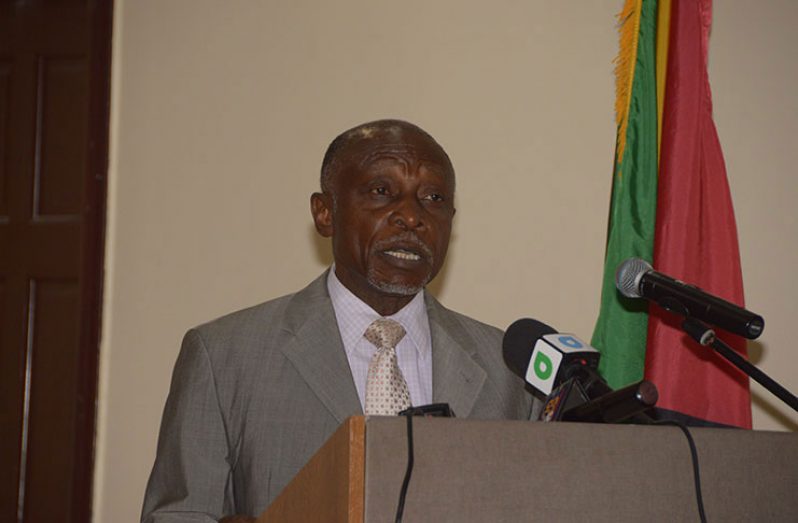WITH a focus on improving job creation, business climate and facilitating the efficiency and transparency of public services, Ministry of Foreign Affairs, Foreign Secretary, Carl Greenidge, on Friday launched the Guyana Trade Facilitation Roadmap 2019-2024.
The event was held at Princess Ramada Hotel, Providence, East Bank Demerara
The foreign secretary, in his feature address, said the trade facilitation roadmap contains a built-in facility for the provision of technical assistance and capacity building.
“Guyana has established a National Committee on Trade Facilitation (NCTF) and that has been in existence since 2015 and it is chaired by the Guyana Revenue Authority (GRA) and consists of representatives of all the relevant agencies, along with the private sector,” Greenidge said.
He said the Foreign Affairs Ministry also serves as the coordinator and it is the intention that the NCTF will coordinate the overall implementation of the trade processes.
Greenidge explained that this particular course is in its third module, which commenced with earlier workshops in March 2019 and with online courses.
The foreign secretary believes that in the realm of economics, the importance of international trade has been elevated because of the contributions of improving income and welfare in many states globally.
He said liberalisation of markets globally indicates that goods must enter and leave a country expeditiously and without administrative burdens and red tapes.
“Delay is a source of cost, whether it is actually time that is wasted or excessive incidental taxes, they need to be kept at a minimum if you are to take advantage of this instrument that is international trade, which is proven so effective over the last 100 years, which have moved us to the point where we are today,” the foreign secretary said.
The Foreign Affairs Ministry operates as an interface between countries and agencies that are involved in production, exports and imports within Guyana.
On this note, he said, the public and private sectors will benefit from enhanced training to be effective players in the global arena.
“Government is fully committed to realising the benefits of the WTO [World Trade Organisation] trade facilitation agreement because we believe that it will be of tremendous benefit to the people of Guyana. We ratified the trade facilitation agreement on November 30, 2015 and the agreement entered into force in February 20, 2017,” he said.
This trade agreement, he noted, aims to catalyse reforms which are expected to improve the facility of systems which will benefit Guyanese.
“This would reduce transaction cost associated with importing and exporting goods, it will contribute to boosting export competitiveness if we are to survive in the international arena, it will help to sustain greater economic growth, and improve our attractiveness as a destination for investment, whether it is in the petroleum oil sector or in any other sector,” the foreign secretary said.
He said investments are very important and so too the attraction of skills that come with investments.
Greenidge said the exercise facilitates easier access to foreign markets, which together with trade facilitation and customs compliance are notable challenges.
Guyana has implemented the Automated System for Customs Data (ASYCUDA) 2017 word system and it is expected to become fully operational by October 2019.
The operationalisation is a very critical step in the process of trade facilitation as it provides a basis for the implementation of the Electronic Single Window (ESW) system to which Guyana is committed.
Greenidge said an ESW steering committee has been established and it is co-chaired by the Ministry of Business and the GRA. This committee also has an implementation unit.
“In its [government] embrace of new economic resources, Guyana is taking the requisite steps to ensure that maximum benefit from the exploitation of the resources benefit the citizens. In order to do that we require the appropriate legal and regulation framework,” he told the gathering at the launch.
According to Greenidge, key trade facilitation reforms are intended to reduce trade processing time by 50 per cent and transaction costs by 30 per cent by the end of 2020.
By 2024, he said both are expected to see further reduction.
The launch was attended by Chairman of the National Committee on Trade Facilitation/Deputy Commissioner of GRA, Patrick Hyman; ASYCUDA World Implementation Adviser for the United Nations Conference on Trade Development (UNCTAD), Terrence Leonard; Economic Affairs Officer Trade Facilitation, UNCTAD, Bismark Sitorus; and senior foreign service officers.








.png)







